|
|
The Thunder Child: Interviews
An interview with Steve Vertlieb, page 1,
in which he discusses the start of his writing career, Merian C. Cooper's King Kong, Robert Bloch, George Pal, The Thief of Bagdad and more. |
|
| 1. You've been writing in various entertainment publications since 1969. Where and when were you born? Any siblings? What did you view or read that sent you on your career path of writing?
|
I was born in a trunk at the Princess Theatre in Pocatello, Idaho. No, actually, that was Judy Garland as Esther Blodgett in A Star Is Born. Sorry about that. I was born in Philadelphia, Pennsylvania on December 15th, 1945 at noon on a Saturday. My mother says I came for lunch. I've enjoyed food ever since. I have a brother, Erwin, who is three years younger than I. We've been best friends since we were kids. Of course, neither of us has ever grown up. I guess I?ve been a movie fan since 1950. I was four years old when my dad brought home our first television set. It was an old RCA black and white unit with a fancy cabinet. I can remember being transfixed by this somehow magic, and magical box that lit up the room when its buttons were pushed. I?ve been known to do the same thing when my buttons are pushed, but that?s another story. Pandora found a willing slave in Erwin and I.
In the early fifties there wasn?t much being broadcast on television during the day, and so a test pattern graced the small screen whenever you dared to turn on the wondrous tube. I would sit for hours in front of the TV, waiting to be transported to a magical land in a strange, uncharted video kingdom. You have to remember that everything was new back then. I would just stare rapturously at that Indian warrior drawn onto the test pattern, waiting for the box to show signs of life and movement.
| When programming eventually began to come alive before my youthful eyes, it was usually in the form of an old movie. Since those early stations could only afford inexpensive fare, and since there was little original programming being produced, most of those early transmissions consisted of old movies, generally from the early thirties. Consequently, my interests and tastes were formed by the likes of Larry ?Buster? Crabbe as Flash Gordon, Buck Rogers, and Red Barry (it?s funny how they all looked alike), and William Boyd as Hopalong Cassidy. I particularly related to Hoppy since he had white hair, and so did my dad. |
I especially enjoyed science fiction and fantasy in those early days of yesteryear. |
Thus began my life long love affair with the moving image. I especially enjoyed science fiction and fantasy in those early days of yesteryear. My youthful mind was completely captivated by adventures that would transport me to distant lands, and infinitely stranger universes. While I may have matured intellectually over the ensuing years, emotionally I?m still that na? and innocent little kid who stared yearningly into Pandora?s illustrious box.
Later, when original programming began to proliferate the airwaves, producers found a brand new audience in youngsters just waiting to blaze wondrous and adventurous Happy Trails. There was a lot of original programming on a fairly ambitious scale filmed or broadcast live just for kids. I can remember awaking excitedly every Saturday morning, knowing that I?d shortly be transported to spectacular and dangerous new worlds aboard a rocket ship called the Terra, along with Commander Buzz Corry and Cadet Happy of the Space Patrol.
| There were a lot of other science fiction programs designed especially for children in those days?Rod Brown Of The Rocket Rangers |
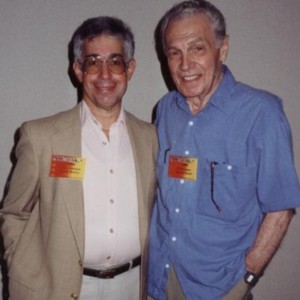
With my earliest boyhood hero, Ed Kemmer...Commander Buzz Corry of Space Patrol |
(starring a young Cliff Robertson in the title role), Tom Corbett: Space Cadet (with the late Frankie Thomas), a German made Flash Gordon, Commando Cody, Captain Midnight?but my favorite was, and is, Space Patrol. I adored Buzz Corry, and lived for his weekly adventures. I had the opportunity to meet and befriend Ed Kemmer, the actor who portrayed the Commander, during the last few years of his life. That was quite a thrill. When I met him, I told him that I had loved him for fifty years. He looked at me, examined my features, and exclaimed ?You couldn?t possibly be that old.? I smiled and said ?Yes, I could.? I also had the pleasure of knowing Buster Crabbe for many years?but that?s another story.
At any rate, when I started going to the movies every Saturday afternoon for the obligatory Saturday Matinee (where was John Goodman when you needed him?) I discovered a world that would dramatically change my life forever. I had found a new lover?the movies?and I would never be the same again. I never wanted to leave my seat when the movie ended. I had to find a way to take the story I had just seen home with me. I could accomplish this, I discovered, by starting a journal. I could imprison the movie I?d seen forever in my heart by writing it down, by transcribing my recollection of the images on the theatre screen into a journal?a journal I guarded with my young, impressionable life. Each week when I returned from the movies, I would write down the story of the adventure I had just experienced and save it forever?or, at least, until the advent of video tape and DVD?s. And that, dear children, is the story of how I began my writing career, and love of motion pictures.
|
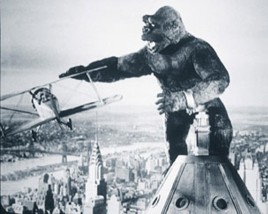
2. You?re an acknowledged expert on the original King Kong:
lead chapter in The Girl in the Hairy Paw in 1976 contributed significant journalistic artistry to Britain?s King Kong Cometh in 2005
reviews of the Jackson King Kong for Red Hot Planet
appeared as a guest speaker in 1993 at Chicago?s historic Gateway Theatre for Turner Entertainment?s gala celebration commemorating King Kong?s sixtieth anniversary
offered consultation in 2005 for preparation of the premiere DVD release of King Kong for Warner Bros. Home Video.
Can you give us some background on how you got these various commissions? Also, how long have you been writing, and what?s the background of your work for Red Hot Planet?
|
Yes?
Just kidding. That?s a mouthful, as Kong might have said after dinner. Well, I?ve been writing for a variety of publications since 1969. If I?ve done the math properly, that?s thirty seven years. Beginning in 1972, I started writing for a bi-weekly tabloid based in New York called The Monster Times. It was run by Brill and Waldstein, as I recall, with the chief editing chores being performed by a very nice gentleman named Chuck McNaughton. Allan Asherman and I were among the very first writers to work for the publication. In addition to our massive and regular writing assignment, we were also given the dubious credential of Associate Editors. Since King Kong was, and is, my favorite film (I?ve seen it two hundred times) the selection of my first article for the tabloid was an easy one. I thought I?d write a series of articles about the production, background, evolution and filming of the Merian C. Cooper/Ernest B. Schoedsack classic.
I befriended Merian Cooper in 1965 through correspondence. We never met, but our correspondence was intense from 1965 until his death in 1973. I adored him. I guess he was flattered that this nineteen year old kid would respect and idolize him or, for that matter, even know who he was. There were weeks, during these eight years, when I might receive as many as five letters, telegrams, or packages from him in a single, seven day period. Seven years after his passing I managed to spend a wonderful afternoon in the home he had shared with his lovely wife, Dorothy, in Coronado, California. It was 1980. I was visiting my brother, Erwin, in the Valley. Dorothy invited us to come to the house and visit with her.
| General Cooper?s son, Richard, was also there. I held the original, leather bound script for King Kong in my hands, and stood next to the famous framed drawing, presented to Cooper by the cast and crew of Kong in 1932?a caricature of the film maker, megaphone in hand, yelling ?Make it bigger?Make it bigger.? When we left their home later that afternoon I grew emotional and took Dorothy?s hands in mine. ?I wish he had been here,? I said. Quietly, she smiled and said??He is.?
|
I held the original, leather bound script for King Kong in my hands |
At any rate, after The Monster Times articles on Kong were published, I received a telephone call from a couple of college professors who had written a prestigious series of film books. They wanted to talk to me about using my articles in a book they were planning about King Kong. We agreed to meet at my parent?s house and go out to lunch to discuss it. Harry Geduld was the head of the film and comparative literature departments at the main campus of Indiana University in Bloomington, and Ronald Gottesman taught film at Rutgers University in New Jersey. I was, of course, delighted at the prospect of seeing my work reprinted in a book. However, it would be another four years until a deal could be reached with a publisher. I re-wrote and re-edited the articles into a more coherent form, and my work eventually became the first chapter in The Girl in the Hairy Paw, which was published by Avon Books in 1976. There weren?t a lot of books on film in 1976 so, even though it may not sound like a lot by today?s standards, 25,000 sales of the book seemed rather impressive back then.
SaveI received an E-Mail from a gentleman in England last year, a writer and editor who was in the midst of compiling articles for a new volume he was preparing for Plexus Books in London on the proverbial gorilla, which they hoped would coincide with the Christmas release of Peter Jackson?s King Kong. Paul A. Woods was the editor of the volume?a very nice gentleman. He asked for permission to use ?portions? of my original Monster Times articles ("The Men Who Saved King Kong") in his new book on Kong.
I told him that it was fine, but that I?d prefer he use the more polished version from The Girl in the Hairy Paw. The Monster Times had attempted to tone down my original series to make it more palatable to kids, so I was more comfortable with the version I had re-written for the book. For some reason, he wanted to use only the latter portion of the tabloid series, and so I reluctantly acquiesced. He asked me if I had anything else on Kong, and I told him that I had another, as yet unpublished piece on the movie, that had been written for an earlier book on the sexual symbolism of horror films which never saw print. The book had been scrubbed.
It was written as a lark, a somewhat over the top exploration of every sensual innuendo implied in the famous film. |
I hadn?t taken the article terribly seriously. It was written as a lark, a somewhat over the top exploration of every sensual innuendo implied in the famous film. He asked me to send it to him anyway, which I did. He loved it, and asked if he could use it for the book, as well. Consequently, when King Kong Cometh was published by Plexus in December, 2005 it contained not only elements of "The Men Who Saved King Kong" from The Monster Times, but also "Beauties And Beasts: The Eroticism of King Kong." The book was quite handsome and featured my name
on the back cover. Although it didn?t sell terribly well, the volume was dedicated to Kevin Brownlow and myself. |
Bill George had begun working on a new science fiction/fantasy web site called Red Hot Planet. I?d gone to school with Bill at the University of Maryland for a time, and had written for one of his earliest magazines, The Late Show. He asked if I?d be willing to write for the new web magazine, and I said yes. I wrote about ten major biographical essays for Red Hot Planet?studies of Orson Welles, Miklos Rozsa, Boris Karloff, Bela Lugosi?as well as a number of shorter articles and film reviews, including a less than favorable critique on Peter Jackson?s King Kong, and an article on the filming of Kreating Karloff called Under The Stars of Egypt. Sadly, the web site has apparently fallen into a creative crevasse and has produced little of late. I?m hoping that they?ll pull out of it, and come back to life.
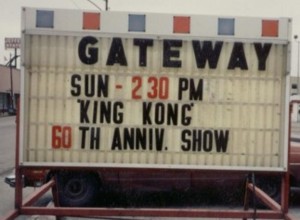 |
The sixtieth birthday celebration for Kong in Chicago was a lot of fun. |
I?d been contacted by some folks out there who wanted to put together this terrific show. The late, wonderful George Turner of American Cinematographer and The Making of King Kong (with Orville Goldner) was one invited guest?and I was the other. I loved George. He was a terribly sweet man.
CancelCloseTurner Entertainment co-sponsored the event, and even sent over a silly man in a gorilla suit to greet the children. George and I sat on stage and answered questions from the packed audience at Chicago?s famous Gateway Theatre. A performance of King Kong in 35 millimeter was screened after George and I left the stage. As I say, it was a great deal of fun.
Edit FileWhen finished, click Save or Cancel below. Change PermissionsReadWriteExecuteUserGroupOtherFile VersionsWarning: Restoring an older version will overwrite tAn old friend of mine, Wes Shank, was contacted by an independent producer at Warner Bros. about the documentary reel and extras they were preparing for the premiere, double disc DVD presentation of King Kong. Phil Savenick had produced quite a few of these behind-the-scenes features and documentaries for the studios, and he was preparing a segment on the infamous deletion of the spider crab sequence from the original King Kong. He told Wes that he was under the impression that the scene where the men, after being thrown from the log and into the ravine below by Kong were devoured by prehistoric spider crabs, was excised by RKO in 1938, along with the rumored ?rape? scene and a few others deemed too violent by the ?bored? of censors. Wes said ?you?d better talk to Steve Vertlieb,? and gave him my number.
When I spoke with Phil, I told him that the spider crab sequence had been deleted by Merian Cooper before the picture had even been scored by Max Steiner, and was never seen by the public. Phil recounted stories by Ray Bradbury of seeing the sequence as a boy in the theatre and being terrified by it.
| I said to Phil??Look, Ray Bradbury is a friend of mine, and I adore him?but?he couldn?t have seen the spider crabs in the theatre because that scene was edited out of the picture before it was ever completed or screened in its entirety.? Over the years, reports have emerged from young fans all over the world claiming to have seen the missing sequence in theatres in Manilla, Brazil, Argentina, or Cuba?but it?s simply not possible. The spider crab sequence was a part of the original test reel that Cooper showed the executives at RKO?s New York offices, and what prompted the enthusiastic ?money men? to green light the picture. |
He couldn?t have seen the spider crabs in the theatre because that scene was edited out of the picture before it was ever completed or screened in its entirety |
When Cooper got back to Hollywood, he began to feel that the scene, although exciting, slowed the pacing of the picture. He wrote me on numerous occasions that he had taken the scene out of the picture before ?Maxie? Steiner had ever written a note. Since the film is wall to wall music (the first important original symphonic score of the sound era), it?s rather unlikely that anyone could have seen the sequence with virtually a silent track. Phil said ?That?s all well and good, but prove it.? I said ?No problem. I?ll send you a photo copy of a letter written in Merian Cooper?s own hand in which he reiterates what I?ve just explained.? I circled the explanation on the copy of Cooper?s original letter that I sent to Phil, and you can see that letter with the circle in MY hand in the two and a half hour documentary that accompanies the film. Consequently, there?s a special ?Thank You? to me near the end of the exhaustive list of acknowledgements found at the conclusion of the impressive documentary.
|
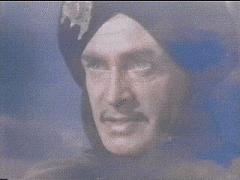
Conrad Veidt as Jaffar
| 3. You wrote a career summation on the life and music of Miklos Rozsa. Did you find anything of interest in Rozsa?s work for Conrad Veidt?s The Thief of Bagdad? Was this originally intended as a musical? (I?ve got an MP3 of Rex Ingram?s Genie song)
|
The Thief of Bagdad was never intended as a musical. However, there are several quite lovely songs in it. Originally, the director had hired his friend Oscar Strauss, whose specialty was operettas, to write the score. Alex Korda was horrified when he heard the music that Strauss had written and begged Rozsa to come in and write a serious symphonic replacement score. Rozsa was instructed to sit in the rehearsal room, which was situated next to the director?s office, and play his newly written compositions on the piano all day every day until it elicited a response from Ludvig Berger. It did. The musical themes drove him crazy, until he finally stormed into Korda?s office, demanding to know what was going on and what he was listening to. Berger was not a ?meister? of music?but he knew enough to realize that the Rozsa thematic material was beautiful, and far superior to the light Viennese pabulum that he was being fed by Strauss. Berger dismissed an outraged Strauss, whose ego was monetarily stroked by the compensatory fee paid him by Korda in order to get rid of him. Rozsa?s music is a brilliantly realized, Arabian night?s fantasia, a rich symphonic tableau of gloriously romantic themes.
Once you?ve seen the film and heard that rapturous musical score, it?s unlikely that you?ll ever be able to forget it. Knowing Rozsa for twenty five years was one of the greatest joys of my life. I once joined him at a film seminar in Bloomington, Indiana for two days in 1979. George Pal was there, as well. I was sitting on a couch and talking with Rozsa on the last day of the conference when the head of Rozsa Society came over and borrowed him for a private luncheon.
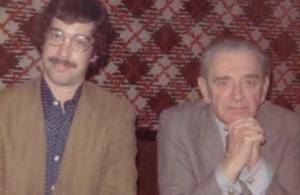
With beloved friend, and inspiration...Miklos Rozsa
We had spent some eleven hours sitting together at the conference and so, since I was not yet a member of the society named in his honor, I walked away and allowed him to be escorted into the dining hall. A moment later the head of the group, John Fitzpatrick, ran out from the door to the restaurant, racing toward me. I grew alarmed and asked ?What?s wrong? Is Dr. Rozsa okay?? John smiled and responded that they had just sat down to lunch when Rozsa looked up at him and asked ?Where?s Steve?? I swear, I damn near cried. I was then led into the luncheon where I sat, once again, next to Miklos Rozsa. When he was preparing to leave for the airport, Rozsa took my hands in his and said ?I feel you are very sincere.? I damn near cried again. It was an unforgettable moment.
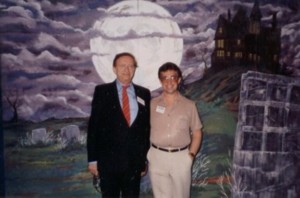
With dear friend and mentor, Robert Bloch |
Another unforgettable result of attending that two day seminar was that George Pal and I were leaving for our respective planes in Indianapolis at the same time. Consequently, George and I shared a private limousine to the airport and talked together for an hour. He told me that he owned the master tapes of Rozsa?s score for his production of The Power for MGM, and that he was going to give them to the Rozsa Society in order to have them made available to his millions of admirers. A few months later I saw Pal again? this time at his office at Paramount Pictures. I flew to Los Angeles to visit my brother for a couple of weeks in the summer of 1979.
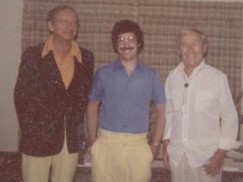
Robert Bloch, Steve Vertlieb, and George Pal
Robert Bloch was a dear personal friend, and Bob volunteered to spend the day with us, driving my brother and I all over Los Angeles, showing us the sights. We stopped off at Paramount where George Pal was in his office, preparing a mini-series for CBS based upon H.G. Wells In The Days of the Comet. Bob Bloch was writing the teleplay. It was a wonderful afternoon filled with promise. Sadly, the project was never realized. George died of a sudden heart attack not long after that meeting at Paramount.
|
Please go to page 2 of the Steve Vertlieb Interview,
in which he discusses Hammer's premiere soundtrack composer James Bernard,
The Monster Times, Ray Harryhausen, Kreating Karloff, and more!
Note: All photos featuring Mr. Vertlieb were supplied by him, are reproduced with his permissission, and retain his copyright.
Return to:
 |
Click on the icons for new features in The Thunder Child.
Radiation Theater: 1950s Sci Fi Movies Discussion Boards
The Sand Rock Sentinel: Ripped From the Headlines of 1950s Sci Fi Films
|
 |
|
Recommended Reading

Learn more or
Buy Now

Learn more or
Buy Now

Learn more or
Buy Now

Learn more or
Buy Now

Learn more or
Buy Now

Learn more or
Buy Now

Learn more or
Buy Now
THE GIRL IN THE HAIRY PAW
Buy Now

Learn more or
Buy Now
|










